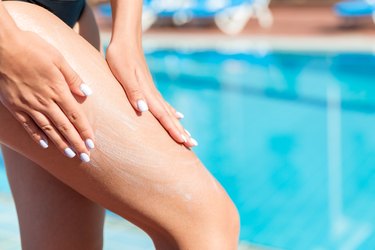
There are a few different things you probably think to lather on before heading out for a workout. For starters, SPF. Maybe a little bit of Body Glide or another anti-chafing product. But have you given topical thermogenic exercise gels — such as Sweet Sweat — a try?
If you've never heard of thermogenic exercise gels, a little background: When applied to the body prior to effort, these substances are intended to support circulation and increase sweat, without demanding that the wearer works harder or longer. Users often pair this gel with a neoprene wrap to keep in heat. Think it all sounds a little sketchy? You're not the only one.
Video of the Day
Video of the Day
What the Manufacturers Claim
For starters, it's important to note what's at stake for companies that market sports nutrition and weight-loss supplements — of which topical exercise gels are a hybrid. The global sports supplement market is forecasted to reach $24 billion by 2025, according to market research company Grand View Research, and the weight-loss market is projected to reach $278.95 billion at the end of 2023, according to Orbis Research.
Despite their profitability, both the sports nutrition and weight-loss industries have often drawn skepticism due to a history of false and often unprovable manufacturer claims.
Out of the topical exercise gel products LIVESTRONG.com examined, all shared one common ingredient: a synthetic or natural oil or proprietary blend of oils. These oils included:
- Petroleum-based oils
- Jojoba oil
- Coconut oil
- Linoleic oil
- Olive oil
Manufacturers claim these oil-based exercise gels target subcutaneous–fat — which is directly underneath your skin — and assist in releasing that fat into the bloodstream so that it can be used for energy. The process at play is thermogenic — or heat-producing — and allegedly opens sweat pores for improved circulation and weight loss, according to product descriptions.
"Sweating is your body's air-conditioning mechanism," says thermoregulation expert Robert Girandola, PhD, associate professor of biological sciences at the University of Southern California. "The only way you can increase sweat rate is if you increase body temperature. Exercise will do that. A sauna will do that. But I've never heard of a situation where sweat can be increased with an oil."
Sweet Sweat — distributed by a company called Sports Research — also claims that their product aids in burning and eliminating stubborn fat. Girandola is skeptical, at best. "Sweat does increase caloric cost, but the amount of calories related to sweat loss is so minuscule that if you could measure it [during a workout], you wouldn't fill a thimble," he says, adding that the vast majority of weight loss from sweat is due to water loss.
The Downsides of Thermogenic Gels
While Girandola felt that exercise gels were fairly benign if used as directed, there are potential downsides to using them — especially given that they've not been widely studied.
"If a product or accompanying neoprene wrap were to prevent sweat from forming intentionally or otherwise, a person can get overheated," Girandola cautions. "That's where you run into cardiovascular problems."
Exercising strenuously can lead to significant fluid loss, and it's important to rehydrate so that your body can continue to function at its best. Signs of dehydration include feeling dizzy or lightheaded, having a dry mouth and not urinating as much as usual. If you're dehydrated, you won't feel as strong in your workout and your reactions won't be as fast as they could be, according to the Mayo Clinic.
Most topical exercise gel labels include disclaimers such as "not FDA approved." Just like a good diet involves eating all the different food groups and avoiding processed picks, the same is true of exercise and weight loss: It requires hard work. In other words, buyer beware. If you are planning on using a topical thermogenic exercise gel, it's best to consult with a physician first.
Other Thermogenic Options
To make weight, wrestlers have traditionally worn plastic suits in the sauna to sweat and lose water weight. A modern version of this weight-loss method is a sauna suit. A sauna suit requires a one-time purchase, whereas you'd have to repeatedly buy a gel. Before purchasing a sauna suit, make sure to touch base with a medical professional.
Thermogenic supplements are another alternative to exercise gels. These have natural ingredients intended to support your metabolism and increase fat burning, like caffeine, green tea, capsaicin and other plant extracts. But as is the case with gels, the evidence that supports these claims is sparse. It's best to check with your doctor before adding any of these supplements to your regular routine.
- Mayo Clinic: "Dehydration"
- Orbis Research: "Weight Loss and Weight Management-Global Market Outlook (2017-2023)"
- Grand View Research: "Sports Nutrition Market Size, Share & Trends Analysis Report By Product (Drinks, Supplements, Foods), By Distribution Channel (E-Commerce, Brick & Mortar), By Region, and Segment Forecasts, 2018 - 2025"
Is this an emergency? If you are experiencing serious medical symptoms, please see the National Library of Medicine’s list of signs you need emergency medical attention or call 911.